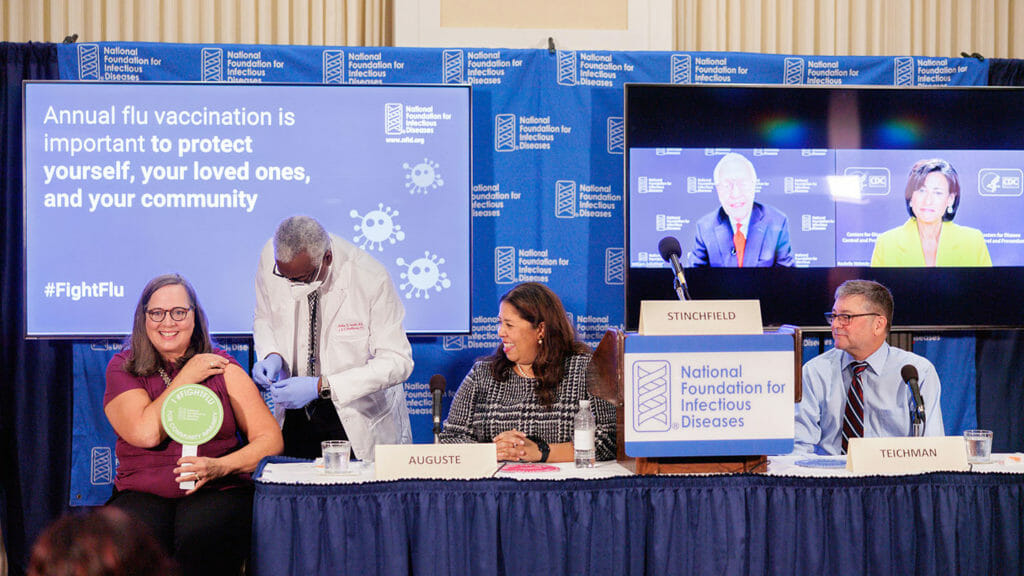
Flu season is about to ramp up in a big way, and experts are concerned that low numbers of adults planning on vaccination will leave half of all US adults vulnerable to influenza and its complications.
A new survey of 1,000 US adults by the National Foundation for Infectious Diseases found that only 49% of US adults plan to receive a flu vaccine during the 2022-2023 flu season. The message during a Tuesday press conference was simple: everyone six months and older should be vaccinated against the flu now.
New this year, three higher dose and adjuvanted flu vaccines designed to trigger a stronger immune response are now preferentially recommended for older adults by the Advisory Committee on Immunization Practices for the US Centers for Disease Control and Prevention.
“Last flu season, nearly half of adults received their flu vaccine — with adults age 65 and older leading in flu vaccine coverage,” said CDC Director Rochelle P. Walensky, MD, MPH, adding that the NFID survey revealed 65% of older adults plan to get a flu vaccine this year.
Last season, an estimated 9 million people were sick with the flu, 4 million visited a healthcare provider, 100,000 were hospitalized and 5,000 died due to flu or complications from the flu.
“Based on what we have seen in parts of the Southern Hemisphere, flu has the potential to hit us hard this year,” said NFID Medical Director William Schaffner, MD. “On a positive note, we have more preventive behaviors in our toolbox than we did before the COVID-19 pandemic. We are more accustomed to wearing masks and staying home when sick.”
Vaccination prevents complications
Even in cases where the flu vaccination doesn’t completely prevent infection, NFID President Patsy A. Stinchfield, RN, MS, CPNP, said, it can reduce the duration and severity of illness and prevent serious complications, including heart attack and stroke.
Schaffner said that one of the greatest underappreciated side effects of influenza infection is its ability to create an inflammatory response in the body that lasts for weeks. Individuals with underlying heart disease can be at increased risk for heart attack and stroke due to the effect on the small blood vessels leading to the heart and brain.
“Flu is not just a bad cold,” Stinchfield said. “Flu can cause mild to severe symptoms, life-threatening complications including hospitalization and death.”
COVID-19 continues to affect behaviors
The effects of the pandemic continue, according to the NFID survey. A majority of US adults (58%) reported that they expect to wear a mask at least sometimes during flu season.
But for most US adults, personal experience with COVID-19 did not change their likelihood of getting a flu vaccine, the survey found. Among those who tested positive for COVID-19, 25% said the result makes them more likely to get a flu vaccine. And only 32% of adults said they are extremely or very confident about the safety of receiving a combination flu and COVID-19 vaccine.
“These survey data are concerning,” Stinchfield said. “The updated COVID-19 boosters are safe and convenient to get at the same time as a flu vaccine.”
Walensky said that a CDC study of more than 450,000 people conducted throughout the pandemic indicated that it is safe to receive a combination flu/COVID-19 vaccine. Those who received both vaccines at the same time, she said, were only slightly more likely to experience side effects in the days following vaccination, including injection site soreness, fatigue and headache.
Don’t forget the pneumococcal vaccine
In addition to flu, the NFID survey also explored attitudes and behaviors about pneumococcal disease. Among those aged 65 or more years and individuals with underlying health conditions at higher risk for disease, 29% report that they had been advised to obtain a pneumococcal vaccine.
Among that same group, the NFID survey found gaps in awareness and understanding about pneumococcal disease and vaccination. According to the survey results, 45% of those at higher risk for disease were not familiar with pneumococcal disease and vaccination, and 29% of those at higher risk reported that they were advised to receive a vaccine — but 74% of them said they did get vaccinated.
This article originally appeared on McKnight's Senior Living





